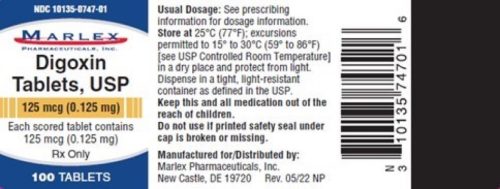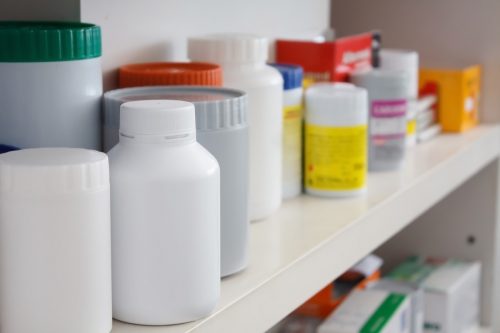Heart Medication Recalled After Dangerous Label Mix-Up, FDA Warns

When you pick up your prescription from the pharmacy, it comes with clear instructions for how much to take and when. Your pharmacist even asks if you have any questions before you head home. In general, you also trust that your doctor prescribed the correct dose, so you probably don’t think to double-check the physical tablets or capsules you’re given. However, mistakes do happen, and now, the U.S. Food and Drug Administration (FDA) is announcing a recall of heart medication due to a label mix-up and resultant dosage concerns. Read on to find out why the agency wants you to stop taking certain tablets immediately.
RELATED: 2 Medications Recalled After Major Mix-Up: “Serious Adverse Events,” FDA Warns.
Heart medication is being recalled.

In an Aug. 31 news release, the FDA announced that Marlex Pharmaceuticals, Inc. is voluntarily recalling one lot of 0.125-milligram Digoxin Tablets USP and one lot of 0.25-milligram Digoxin Tablets USP.
The medication was distributed nationwide and is prescribed to treat mild to moderate heart failure, per the FDA. The drug increases heart muscle contractions for pediatric patients with heart failure, and it controls the ventricular response rate in adults with chronic atrial fibrillation, commonly known as AFib.
RELATED: Probiotics Sold at Walmart and Amazon Recalled for “Possible Health Risk,” FDA Warns.
The two products were mixed up.

According to the FDA, recalled products were mislabeled. Packages for the 0.125-milligram Digoxin tablets actually contain 0.25-milligram tablets, while the packages for the 0.25-milligram tablets contain the 0.125-milligram tablets.
“The mix-up in labels can cause either overdosing or underdosing in patients who unknowingly take the wrong dose,” the release reads.
Those who take the larger dose but are supposed to take the 0.125-milligram tablets will “receive a super potent dose and can experience significant drug toxicity (mental disorientation, dizziness, blurred vision, memory loss and fainting) from the unintentional overdose,” according to the FDA.
On the other hand, those who take the smaller dose but are supposed to take the 0.25-milligram tablets will get a “sub potent dose.” These patients may then not have adequate medication to control their heart rate, leading to potential heart failure.
RELATED: Birth Control Pills Recalled Because They May Not Work, FDA Warns.
Stop taking recalled pills if you have them at home.

As of Aug. 31, Marlex Pharmaceuticals hadn’t received reports of any adverse events related to the recall, but the FDA still advises anyone with the tablets to stop using them and return them to their place of purchase. Marlex is also notifying both distributors and customers via email to let them know about the recall and arrange for the return of affected products.
If you take Digoxin tablets, take a look in your medicine cabinet. You should be able to tell which dose you have by looking at the pills, which are two different colors.
The smaller dose tablets (0.125 milligrams) are “yellow, circular, beveled, uncoated,” and scored in the middle. On one side of the pill, they have “N” and “201” on either side of the scoring, while the other side is plain. The larger dose tablets (0.25 milligrams) are the same shape but “white to off-white” in color. They’re scored on one side, too, with “N” and “202” on either side of the score mark.
Recalled 0.125-milligram tablets have a lot number of E3810 and an expiration date of Feb. 2025 (2/2025). Recalled 0.25-milligram Digoxin tablets also have a Feb. 2025 expiration date, but their lot number is E3811. Both medications came in packages of 100.
Call your doctor if you take this medication and have health concerns.

If you experience any issues related to these drugs, the FDA asks that you contact your physician or healthcare provider. In addition, if you experience an adverse reaction, report it to the agency’s MedWatch Adverse Event Reporting program online, by mail, or via fax.
For questions about the recall, you can reach Marlex Pharmaceuticals by phone at 302-328-3355, or toll-free at 888-582-1953, Monday through Friday, between 8:30 a.m. and 4:30 p.m. Eastern Standard Time (EST).
RELATED: For more up-to-date information, sign up for our daily newsletter.
Best Life offers the most up-to-date information from top experts, new research, and health agencies, but our content is not meant to be a substitute for professional guidance. When it comes to the medication you’re taking or any other health questions you have, always consult your healthcare provider directly.
- Source: https://www.fda.gov/safety/recalls-market-withdrawals-safety-alerts/marlex-pharmaceuticals-inc-issues-voluntary-nationwide-recall-digoxin-tablets-usp-0125mg-and-digoxin
- Source: https://www.fda.gov/safety/medwatch-fda-safety-information-and-adverse-event-reporting-program/reporting-serious-problems-fda
- Source: https://www.fda.gov/safety/medical-product-safety-information/medwatch-forms-fda-safety-reporting